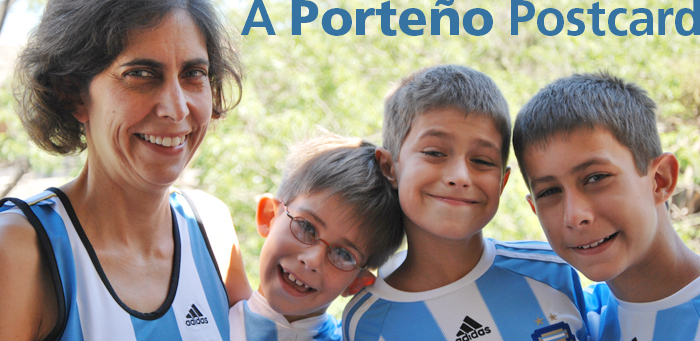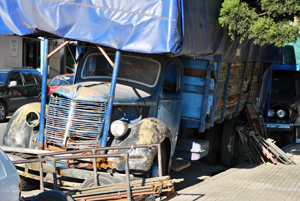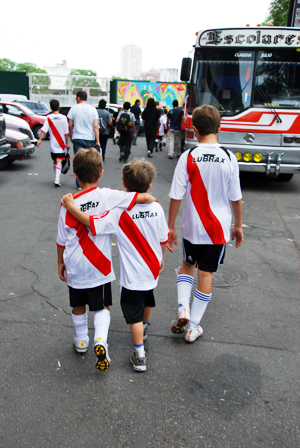Shauna Van Praagh, on sabbatical with René Provost and their three boys, reports on life in Buenos Aires

An Argentinian speaks to a friend and colleague in Washington, after moving back to Buenos Aires after a few years spent with his family living in the United States. “What do you miss most from here, now that you’re back home?” asks the American. “Law and Order,” comes the porteño’s reply. “Oh yes, I love that show too,” says the American. To which the Argentinian retorts, “I’m not talking about television.”
This is the telling and true story of a porteño (resident of Buenos Aires) we know, recounting the challenges of coming home to Buenos Aires after a long stint in Washington. The lack of “law and order” largely seems to explain the reaction of Argentinians to our story of hesitating between Barcelona and Buenos Aires as the location for our sabbatical year.

“You took the wrong plane!” is the typical, sardonic, and self-deprecating comment regarding our choice. Understanding the relationship of Argentinians to both “law” and “order” – in all formal and less formal incarnations – is perhaps the greatest challenge of living for a year in this huge, complicated, and always fascinating city.
Last year at McGill, in Extra-Contractual Obligations/Torts, I illustrated different approaches to the “duty to rescue” with short YouTube videos borrowed from the evening television news. In one, a small truck got stuck crossing a railway line and was literally pushed across just in time by a motorcyclist who had jumped off his motorcycle in order to help, and who barely managed to avoid being hit by the oncoming train. [NDLR: see video here.]
One of the students in the class had lived in Argentina, and explained to the rest of us that it was no surprise that the heroic rescue had taken place in the Argentinian provinces. In a country where people don’t have much, including the state, to count on, they count on each other, he said. Individuals help each other out, even in dangerous circumstances.
It may be somewhat simplistic to attribute the near-crazy willingness to assist to its Argentinian setting. But it is not difficult to find other evidence of the heightened sense of shared citizenship that grounds a strong readiness to lend a hand. Neither is it difficult to contrast that picture with its co-existing image of brash individualistic disregard for rules, order, and others.
A few days before the “Super Classico” between River Plate and Boca Junior at the Monumental Stadium behind our apartment, we watched in wonder as a long line of fans stretched from the stadium all the way past the parks behind the Lycée Franco-Argentin that our boys attend and where they are adding Argentinean Castellano to their repertory of languages.
People had started lining up before sunrise, and, at 8:30 when we found them, they were still standing patiently and more fans were joining the line, about 35,000 in all. They were serious, solemn, and silent – and looked more like they were visiting a funeral home than waiting to buy tickets to see their favourite teams play soccer.
On the day of the match, a day when riot police lined the main avenue near the stadium, the lines were also calm and dignified even in the increasing excitement of the afternoon. Everyone was polite and responsible, as dictated by a collective football fan identity.

The fact that River fans are directed to walk along one street, however, while Boca fans head to the game by a different route, gives a warning of the contrasting craziness of the stadium crowd itself. Our boys were disappointed that they couldn’t go to the game, but we had been warned that it was no place for kids…so we contented ourselves with watching on television and listening from the balcony to the roars of delight when River scored.
Our only experience with a soccer game here had already given us a taste of the way in which fans transform from their polite ticket-buying personalities to their wild, jumping, screaming selves. And that was a soccer game pitting Argentina against Spain, so everyone in the stands was on the same side! We had bought tickets for good seats, only to discover that people grab whatever seats they can upon arrival and then refuse to move.
I finally managed to persuade two men that they were sitting in the seats the numbers of which were printed on the tickets that twelve year-old Daniel and I were holding. But René, with the other two, never got anywhere near our seats in the first half, and the crowd standing on the stairs was so dense that he was scared the boys would be crushed. At half-time, he passed Micah (ten) and Ari (seven) over the rows of seats… literally lifted by strangers down to their mother… and then we squeezed all five of us into our two claimed seats for the second half. We did see Messi play, and Argentina properly won. But mostly we survived the complete chaos of sharing soccer stadium space in Buenos Aires.
Argentinian citizens go back and forth, then, between the security they desperately value in their collective co-existence and the high-risk adventure they enthusiastically insist upon as individuals. They wait quietly, they hold out a helping hand, they give up their seats on the bus, they respect shared space. But they also transgress the rules, strike out on their own, set their own directions, and ignore the seat numbers marked on their tickets. We never quite know when our porteño neighbours will do something kind of crazy and defiant and subversive – but we do count on them to make room for us in line, wait as we take our turn, and help us out if we really need it.
So here we are, learning how to live as a porteño family by alternating between patient observation and reckless immersion… and experiencing constant sunshine, out-of-control inflation, and excellent wine as we do it!
Chau de Buenos Aires y feliz año 2011!
